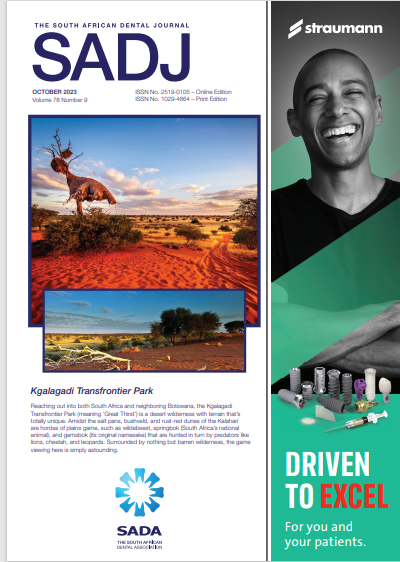Essential non-clinical skills and training required by dentists in South Africa
DOI:
https://doi.org/10.17159/sadj.v78i09.16955Keywords:
practitioners, collaborativeAbstract
Dentists possess clinical experience garnered within supervised clinical settings, primarily aimed at diagnosing, treating and preventing oral cavity related diseases.1 Undergraduate dentistry training mostly focuses on the scientific underpinnings of this discipline and building clinical experience, not allowing adequate time for additional coursework.1 According to Haslach et al.2, dentists choose dental careers because they want to help and work with people, as well as desire job and financial security. The current economic downturn has led to a revenue plunge for many independent dental practices, attributed partially to less per capita patient expenditure.3 In response, patients have increasingly embraced preventative measures over more costly procedures, seeking to minimise expenses.4 The global financial crisis further underscores the value of leadership development, given its potential impact on the efficacy of clinic leaders.
Downloads
References
Barber M, Wiesen R, Arnold S, et al. Perceptions of business skill development by graduates of the University of Michigan Dental School. J Dent Educ 2011; 75(4): 505-17
Haslach SD, Aytepe Z, Kokkari A, et al. Country and gender differences in the motivation of dental students – An international comparison. Eur J Dent Educ 2018; 22(4): e724-e729
Manski RJ, Moeller JF, Chen H, et al. Dental usage under changing economic conditions. J Public Health Dent 2014; 74(1): 1-12
McClure CB, Sæmundsson SR. Effects of a national economic crisis on dental habits and checkup behaviors – a prospective cohort study. Community Dent Oral Epidemiol 2014; 42(2): 106-12
Marks A, Mertz E. Leadership development: A critical need in the dental safety net. San Francisco: University of California. Center for the Health Professions at UCSF. 2012
Frank JR, Snell L, Englander R, Holmboe ES, Icbme Collaborators. Implementing competencybased medical education: Moving forward. Med Teach 2017; 39(6): 568-73
Kalenderian E, Taichman RS, Skoulas A, et al. Developing the next generation of leaders in oral health. J Dent Educ 2013; 77(11): 1508-14
Wali O. Leadership skills in dental curriculum – a review. J Evol Med Dent Sci 2018; 7(42): 4584-88
Patel R, Eaton KA, Garcia A, et al. Factors influencing dental practitioner performance: A summary of recent literature review. Oral Health Dent Manag 2011; 10(3): 119-30
Ireri S, Walshe K, Benson L, Mwanthi MA. A qualitative and quantitative study of medical leadership and management: experiences, competencies, and development needs of doctor managers in the United Kingdom. J Manag Marketing Healthc 2011; 4(1): 16-29
Levin RP. Business innovation in the dental practice. J Am Dent Assoc 2013; 144(2): 203-4
Seaman CL Leadership in dentistry: An empirical phenomenological study of practicing general dentists in South Central Idaho. University of Phoenix: 2008
Clark J, Armit K. Leadership competency for doctors: a framework. Leadersh Health Serv 2010; 23(2): 115-29
Van der Berg-Cloete SE, Snyman L, Postma TC, White JG. Dental students’ perceptions of practice management and their career aspirations. Afr J Health Prof Educ 2015; 7(2): 194-8
Busari JO. Management and leadership development in healthcare and the challenges facing physician managers in clinical practice. Int J Clin Leadersh 2012; 17(4): 211-6
Van der Berg-Cloete SE, Snyman L, Postma TC, White JG. South African dental students’perceptions of most important nonclinical skills according to medical leadership competency framework. J Dent Educ 2016; 80(11): 1357-67
Gill P, Stewart K, Treasure E, Chadwick B. Methods of data collection in qualitative research: interviews and focus groups. Br Dent J 2008; 204(6): 291-5
Hebbal M, Ankola A, Murugaboopathy V, et al. Do Dentists Require Leadership Qualities? Can Med Edu J 2012; 3(1): e80
Morison S, McMullan C. Preparing for the future: challenges and opportunities for management and leadership skills. Br Dent J 2013; 214(1): E2-E2
Clark J, Armit K. Attainment of competency in management and leadership: no longer an optional extra for doctors. Clin Govern Int J 2008; 13(1): 35-42
Frymier AB, Shulman GM. “What’s in it for me?” Increasing content relevance to enhance students’ motivation. Commun Educ 1995; 44(1):40-50
Craven SH. Dentists as clinician managers: Leadership influences on dental team empowerment and engagement (Doctoral dissertation) Walden University, 2017
Miller DL, Umble KE, Frederick SL, Dinkin DR. Linking learning methods to outcomes in public health leadership development. Leadersh Health Serv 2007; 20(2): 97-123
Willeford R. 10 steps to a financially healthy practice, Part 1. Dent Econ 2006; 96(6): 22-6
Harkins D, Butz D, Taheri P. A new prescription for healthcare leadership. J Trauma Nurs 2006; 13(3): 126-30
Klaber RE, Roueché A, Hodgkinson R, Cass HD. A structured approach to planning a workbased leadership development programme for doctors in training. Int J Clin Leadersh 2008; 16(3): 121-9
Coltart CE, Cheung R, Ardolino A, et al. Leadership development for early career doctors. The Lancet 2012; 379(9828): 1847-9
Kabir C, Potty A, Sharma R. Current opportunities for the development of leadership skills for doctors. Int J Clin Leadersh 2008; 16(3): 115-9
Gallagher J, Wilson NH. The future dental work-force? BDJ 2009; 206(4): 195-9
Taichman RS, Parkinson JW, Nelson BA, et al. Leadership training for oral health professionals: a call to action. J Dent Educ 2012; 76(2): 185-91
Parsell G, Bligh J. Encouraging educational leadership. Med Educ (Oxford. Print) 2000; 34(3): 199-200
White JG, Kruger C, Snyman WD. Development and implementation of communication skills in dentistry: an example from South Africa. Eur J Dent Educ 2008; 12(1): 29-34
White JG. Interacting forces influencing private dental practice in South Africa: implications for dental education. SADJ 2008; 63(2): 80-5
Karimbux NY. Teaching dental practice management in a time of change. J Dent Educ 2015; 79(5): 463-4
Manogue M, McLoughlin J, Christersson C, et al. Curriculum structure, content, learning and assessment in European undergraduate dental education-update 2010. Eur J Dent Educ 2011; 15(3): 133-41
Downloads
Published
Issue
Section
License

This work is licensed under a Creative Commons Attribution-NonCommercial 4.0 International License.





.png)